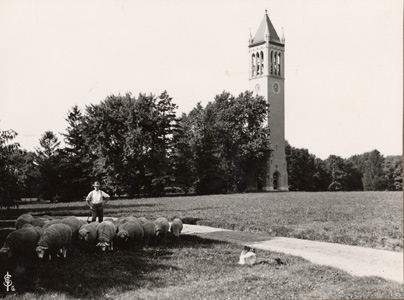|
Iowa
Agricultural College and Model Farm (now Iowa State University) was
officially established on March 22, 1858, by the legislature of the State of
Iowa. Story County
was selected as a site on June 21, 1859, and the original farm of 648 acres
was purchased for a cost of $5,379. The Farm House, the first building
on the Iowa State campus, was completed in 1861.
In 1862, the Iowa
legislature voted to accept the provision of the Morrill Act, which was
awarded to the agricultural college in 1864. Iowa Agricultural
College (Iowa State College of Agricultural and Mechanic Arts as of 1898), as a land grant institution, focused on the ideals
that higher education should be accessible to all and that the university
should teach liberal and practical subjects. These ideals are integral to
the land-grant university. Even before the passage of the Smith-Lever Act of
1914, which established the Cooperative Extension Service, Iowa
State was actively bringing knowledge to the people of Iowa through
farmers' short courses and farm demonstrations. In addition to
extension, applied research is also a part of the land-grant mission,
the Agricultural and Home Economics Experiment Station was founded
in 1888 as a result of the Hatch Act of 1887.
The
first official class entered at Ames in 1869, and the first class
(24 men and 2 women) graduated in 1872. Iowa State
was and is a leader in agriculture, engineering,
extension, home economics, and created the nation's
first state veterinary medicine school in 1879.
In 1959,
the college was officially renamed Iowa State University
of Science and Technology. The focus on technology
has led directly to many research patents and inventions
including the first binary computer (the ABC), Maytag
blue cheese, the round hay baler, and many more.
Beginning with a small number of students and Old Main,
Iowa State University now has approximately 27,000
students and over 100 buildings with world class
programs in agriculture, technology, science, and art.
Iowa
State University is a very special place, full of
history. But what truly makes it unique is a rare
combination of campus beauty, the opportunity to be a
part of the land-grant experiment, and to create a
progressive and inventive spirit that we call the
Cyclone experience. Appreciate what we have here,
for it is indeed, one of a kind.
By Tanya Zanish-Belcher (Associate
Professor, ISU Library) |


